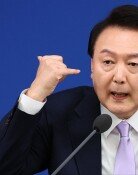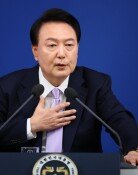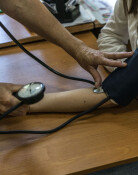Individual investors resort to panic selling on KOSDAQ market
Individual investors resort to panic selling on KOSDAQ market
Posted September. 27, 2011 02:12,
I cannot trust the market. I feel uneasy.
The Korean stock market entered a state of panic Monday as individual retail investors filled with overwhelming fears and distrust went on a mass selling binge. With the expectation that the global financial crisis will not end anytime soon amid jitters over Greeces possible default, individual investors have sold their stock holdings on the market en masse.
In the tech-heavy KOSDAQ market, in which individual investors account for 90 percent of daily trading, the benchmark index went in a free fall. It shed 9.5 percent in just one hour after the market bell, sending a shockwave of panic.
The KOSDAQ saw investor confidence plunge to rock bottom, which caused investors to conduct panicky selling even at small hints of negative developments. As a result, the market is poised to fall below the psychologically important 400 mark for the first time since March 2009.
○ Experts hardly capable of predicting market trends
A 42-year-old used car dealer in Busan in March invested 140 million won (120,000 U.S. dollars) that he had saved over the past 10 years in five KOSDAQ-listed companies. With the KOSDAQ nose-diving Monday, the value of his stocks declined to less than half of their original value.
He pointed his finger at the government, saying, What`s the government doing while poor individual investors are losing money?
On how the government should help, he said, I dont know, adding, I cannot get a goodnight`s sleep due to fears that the companies I invested in will be delisted.
The KOSDAQ plunged 36.96 points, or 8.28 percent, to close at 409.55 Monday. It rose as much as 1.58 percent soon after the market opening but sharply reversed course to plunge 7.91 percent in one hour and 20 minutes.
The portion of trading by individual investors on the KOSDAQ reached 95 percent Monday, as they dumped their stock holdings en masse amid overwhelming fears, adding to their won burden.
Shares of KOSDAQ-listed companies including CJ E&M, ICD, Sung Kwang Bend, which were the preferred choices of individual investors, plunged more than 10 percent, with those of 190 KOSDAQ companies declining to their daily limits.
In comparison, shares of companies in which institutional investors have been buying en masse this month, such as Daum Communications and Neowiz Games, merely declined around 5 percent Monday.
Lim Su-gyun, a researcher at Samsung Securities, said, The portion of individual investors is so high among the investors in the KOSDAQ market that nobody else can afford to buy shares caused by panic selling by individuals.
In the KOSDAQ market, which is dominated by fear, if someone triggers a selling spree (panic selling), the entire market is set to collapse, watchers say.
Investors in the KOSDAQ market are worried that the global recession sparked by the fiscal crisis in Europe will threaten the very survival of KOSDAQ-listed companies. When banks start calling in their loans in the aftermath of the global recession and credit crisis, many small and medium-size companies will not weather the storm.
Notably, smaller companies will inevitably suffer from exchange rate losses due to their weak capacity to cope with exchange rate fluctuations. One KOSDAQ investor said, I`m worried if smaller companies that I invested in can survive at a time when even conglomerates also display slumping performances.
Lee Jong-woo, head of research at Solomon Investment & Securities, said, Fears on the KOSDAQ market have passed the phase where investors are worried about the falling value of companies, adding, Investors are doubtful about the very existence of certain KOSDAQ companies.
Investors are also on shaky ground on the main bourse as well as on the KOSDAQ. The benchmark KOSPI plunged 77.9 points in a matter of one hour from 9:20 a.m. Monday.
Koreas top companies including Samsung Electronics, Hyundai Motor and POSCO, however, saw their stocks decline relatively low or even climb, showing the polarization of the domestic stock market.
○ Corporate performance over int`l collaboration
A flurry of countermeasures has been released every single week. Such measures include U.S. President Barack Obamas announcement of an economic stimulus package, recovery measures announced by the U.S. Federal Open Market Committee, and the annual meetings of the International Money Fund and World Bank.
Additionally, a string of measures for international policy coordination are also in store, including a financial bailout package for Greece worth 8 billion euros to be announced Oct. 3 and discussions on the expansion of the European Financial Stability Fund scheduled in mid-October.
Until recently, stock prices have slightly increased just before the announcement of collaborative measures before falling over disappointment once such measures are publicized. Stock experts recommend that investors pay attention to fundamentals rather than events, meaning that investors should focus on corporate performance, which will effectively demonstrate whether the economy is slowing.
Cho Seong-jun, a researcher at NH Investment & Securities, said, Since stock prices fluctuate due to psychological sentiment, predicting market moves itself is difficult, adding, Investors are advised to wait and see until corporate performance or the overall economy suggests a clear direction.
libra@donga.com teller@donga.com







